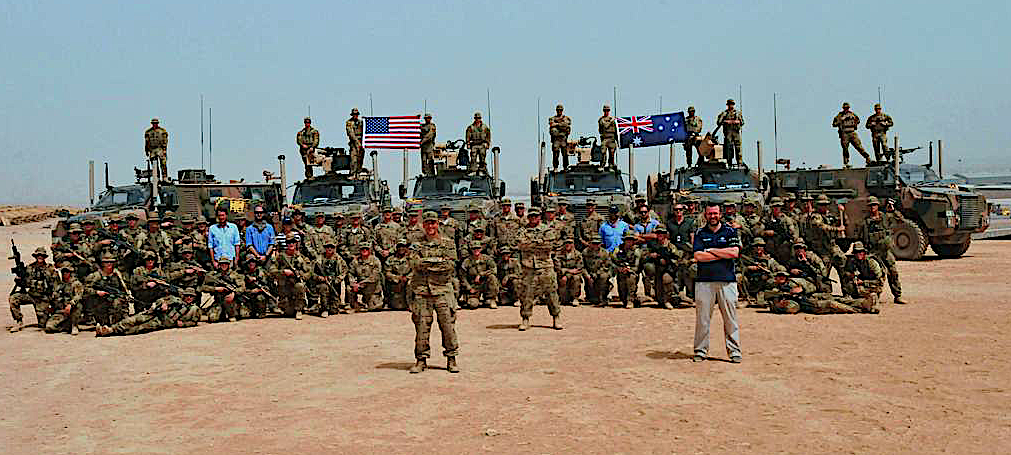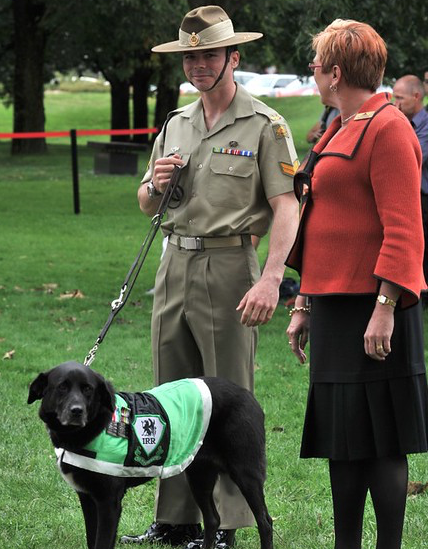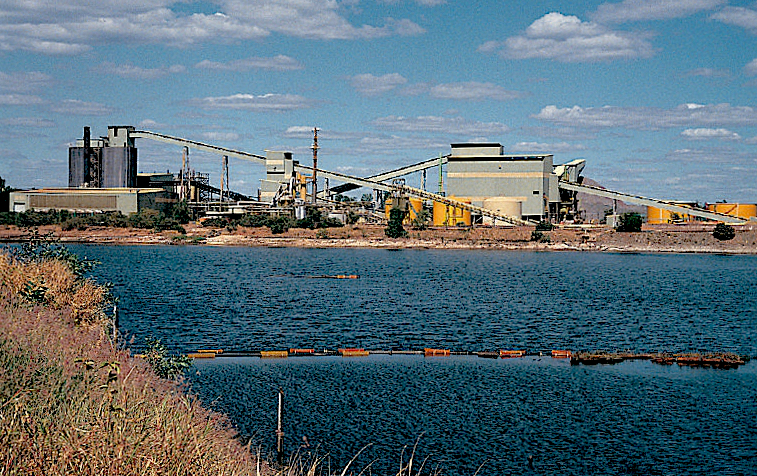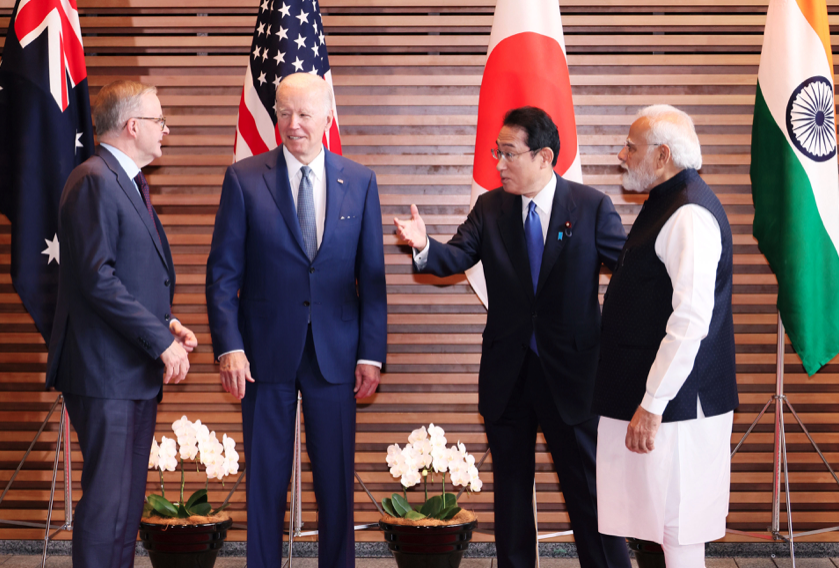Under the guise of protecting the national interest, Australia’s security establishment acts in secret to uphold the global U.S.-led imperial order, writes Clinton Fernandes.

U.S. and Australian soldiers in Uruzgan in occupied Afghanistan, 2013. (Rory O’Boyle, US Navy)
By Clinton Fernandes
Declassified Australia
 The secrecy surrounding Australian foreign and defence policy protects planners from the public that elected them. The war in Afghanistan offers ample evidence.
The secrecy surrounding Australian foreign and defence policy protects planners from the public that elected them. The war in Afghanistan offers ample evidence.
The United States and Australia carried out an assassination campaign against the tactical leadership of the insurgency. Known as the Joint Prioritized Effects List (JPEL), it is an intelligence-driven assassination program enabled by drones and special forces.
The dynamic involves assassinating insurgents without dealing with the root causes of the insurgency. Some Australian forces participated in this assassination campaign, which was known by various euphemisms.
The JPEL-based assassination program was no secret to the Taliban, nor to the population of Afghanistan, some of whom were killed or maimed while merely attending weddings or tending their farms. Nor was it a secret to the intelligence services of neighbouring states such as Russia, China, Iran and Pakistan.
But it was a secret to the Australian public, who had no way to hold the government to account.

April 5, 2011: Explosive Detection Dog Sarbi receiving the Purple Cross from the The Royal Society for the Prevention of Cruelty to Animals. (Australian Department of Defense, CC BY-NC-ND 2.0)
Instead, the Australian Defence Force gave media prominence to Sarbi, a black Labrador explosives detection dog who became separated from her handler, presumed dead, to be found again a year later.
One can hardly blame Australians for lacking expertise when they are deliberately kept in the dark.
Policy-makers usually claim they have a unique ability to judge what constitutes harm to national security.
In relation to AUKUS, then Foreign Minister Marise Payne said: “Nobody who is not part of those discussions and is not part of the decision-making process can ever know—and frankly nor should they know—the detail and the depth of the considerations that governments go into. These have to be done in a confidential way.”
But secrecy in these circumstances does not protect the Australian public. Rather, it protects the security establishment from knowledge of its actions by the Australian public. It allows planners to uphold the U.S.-led imperial order under the guise of Australia’s national interest. It insulates the real aims of policy from robust, evidence-based debate.
This is not national security in any meaningful sense. For all the mystique and secrecy, practitioners have not demonstrated that they possess some special body of technical knowledge that renders them uniquely qualified to determine what constitutes a legitimate reason for secrecy.
Concepts in national security, foreign affairs and the social sciences more generally are accessible to the average human being. Of course, the intelligence agencies have scientific and technical desks whose analysts assess the existence of (say) weapons of mass destruction in Iraq. These analysts do require a relevant technical background.
But anyone can understand the social and political implications of these studies if institutions do not work actively to exclude them.
Judgements about national security or foreign affairs rely not so much on expertise, as on ideology.
It was not that long ago that India — now a great friend and member of the Quad [Quadrilateral Security Dialogue with Japan, Australia and the U.S.] — was regarded as a potential threat to Australia. When India conducted nuclear tests in 1998, the Howard government recalled its high commissioner to New Delhi and imposed sanctions. The Labor opposition condemned what it called “an outrageous act of nuclear bastardry.”
Australia had an important card to play: it has about 40 percent of the world’s known resources of low-cost uranium. It could deny India uranium exports because India did not sign the Nuclear Non-Proliferation Treaty (NPT). A few years later, the United States changed its export control laws to permit assistance to India’s nuclear programs. Labor was in office.

Processing facility at the Ranger uranium mine in Kakadu National Park, east of Darwin, Australia, undated. (Stephen Codrington, CC BY 2.5, Wikimedia Commons)
The United States asked Prime Minister Kevin Rudd to support the “cooperative arrangement with New Delhi.” Six months later, Foreign Minister Stephen Smith gave a private assurance to his Indian counterpart that Australia would support an exception for the U.S.–India nuclear deal. He confirmed this publicly soon afterwards.
In 2016, the Nuclear Power Corporation of India and U.S.-based Westinghouse Corporation agreed to build six nuclear reactors in India. The next year, Australia’s first shipment of uranium left for India. This made India the only country in the world to possess nuclear weapons, not be a party to the NPT and still be permitted to engage in nuclear commerce.
Today, of course, India is considered a partner with Australia in upholding a “rules-based international order” in a “free and open Indo-Pacific.”

Australian Prime Minister Anthony Albanese, left, during QUAD meeting in Tokyo on May 24. (CC BY 4.0, Wikimedia Commons)
Australia has acted as an imperial power. The Department of Foreign Affairs’ internal legal advice, as early as February 1975, was that an Indonesian invasion of Timor-Leste, then known as Portuguese Timor, “would fall into the category of outright aggression.”
Aggression, as the Nuremberg Tribunal declared, is “not only an international crime; it is the supreme international crime differing only from other war crimes in that it contains within itself the accumulated evil of the whole.”
The Whitlam government gave Indonesia the green light to invade Timor-Leste. The Fraser government legitimised the occupation by recognising Indonesian sovereignty over the territory, and helping it diplomatically when its military operations caused the deaths of about 31 percent of its population — the largest loss of life relative to total population since World War II.
[Related: Blood in the Archives]
Australian intelligence agencies targeted the survivors and their descendants in espionage and other operations for the purpose of depriving them of control over their sole major natural resource: their oil and gas fields. Bernard Collaery, the lawyer who disclosed one operation, fought in the courts to have his trial conducted in public. In July 2022, the new attorney-general finally dropped the prosecution against him.

This article is an edited excerpt of the author’s book, Subimperial Power: Australia in the International Arena, which was published in October by Melbourne University Publishing. (MUP)
A public trial might show Australians that the espionage operation occurred under cover of an aid project, jeopardising the safety of Australian aid workers everywhere. It also diverted precious resources of the Australian Secret Intelligence Service (ASIS) away from the war on terrorism. When the ASIS team was in Timor-Leste in September 2004, Jemaah Islamiyah terrorists succeeded in bombing the Australian embassy in Indonesia.
The foreign affairs minister at the time of operations against Timor-Leste, Alexander Downer, worked as a lobbyist for Woodside Petroleum after leaving parliament in 2008. The secretary of the Department of Foreign Affairs and Trade, Dr. Ashton Calvert, retired and joined the board of directors of Woodside.
Professor Andrew Serdy, a former Department of Foreign Affairs and Trade officer, said: “Senior officials at all times simply assumed—whether because of direction to that effect by ministers or their offices I do not know—that the national interest was identical to Woodside’s.”
The Australian public should not be accused of callous indifference when the ideological institutions deceive them about what happened in Timor-Leste for 24 years and what the Australian government did.
They do not know, for example, that just an hour’s flight from Darwin, East Timorese women were enslaved sexually without fear of reprisal and with the knowledge and complicity of the Indonesian security forces, the civilian administration and members of the judiciary.
Australia sent weapons to Indonesia and shielded it from international criticism. Tim Fischer, deputy prime minister in the Howard government, praised Indonesian dictator Suharto as “perhaps the world’s greatest figure in the latter half of the twentieth century.”
A bipartisan elite consensus shields foreign policy from public scrutiny, ensuring that it does not enter the terrain of political contestation.
Australian public opinion on foreign policy issues is rational in this sense; a valuable study by Caroline Yarnell showed that public opinion responds reasonably to triggers such as international events and statements by political leaders.
The public responds rationally to the facts it sees. Inconvenient facts are not censored but are buried all the same; in principle, they are discoverable, but in reality they are out of the public’s awareness because, without regular repetition, no one remembers them.
And they have to remain unrepeated and unemphasised precisely because of Australia’s democratic freedoms. If they were front and centre, they would never be tolerated by Australians.
The question of whether the powerful really believe in their own benevolence is irrelevant as a guide to political action. It might preoccupy writers and others who are entranced by elite sentiment. For those concerned about reforming foreign policy, however, the task is to change the domestic structure of power.
Clinton Fernandes is professor of international and political studies at the University of New South Wales. A former intelligence officer in the Australian Army, Clinton specializes in strategic studies with a focus on international relations and strategy, especially on issues concerning the national interests of Australia.
This article from Declassified Australia is an edited extract from Clinton Fernandes’ book, Subimperial Power: Australia in the International Arena, published on Oct. 5 by Melbourne University Publishing.
The views expressed are solely those of the author and may or may not reflect those of Consortium News.

Good piece, thanks.
Obviously Australia has never been a democracy when it comes to war. A bit of air was given recently to the idea of Parliament voting on war (details were sketchy). Both sides of politics agreed that Parliament shall play no role. It will never be asked. There was no debate about Australian involvement in the global wars of last century. Our Parliament never voted. In the case of the illegal war on Iraq, the decision was taken by one person, and he is living in superannuated splendour as an elder statesman, free to roam the world, and the tsunami of lies he told about WMD is never mentioned. Hundreds of thousands marched against Howard’s War before he ordered the ADF to attack Iraq. As you wrote “the Australian public have no way to hold the government to account.” Clearly protest will not stop our war mongers. It is bi-partisan policy. Within 48 hours of the last election the winner, Mr Albanese, jetted to the QUAD and confirmed ALP support for unquestioning, eternal allegiance to the US Empire (you included a photo of the happy quartet). Since the dismissal of the Whitlam government in 1975 Australia has been a US vassal with some control over domestic events, but none over foreign policy. The USA demands that it’s US / THEM world model is obeyed. It has gone as far as threatening Australia with dire consequences of associating with THEM. Penny Wong understands her “rules based orders” and will not flinch in her obedience. I have stopped voting for the ALP. Whitlam is dead and there is nobody alive to stop Australia’s Wars.
Obviously Australia has never been a democracy when it comes to war. A bit of air was given recently to the idea of Parliament voting on war (details were sketchy). Both sides of politics agreed that Parliament shall play no role. It will never be asked. There was no debate about Australian involvement in the global wars of last century. Our Parliament never voted. In the case of the illegal war on Iraq, the decision was taken by one person, and he is living in superannuated splendour as an elder statesman, free to roam the world, and the tsunami of lies he told about WMD is never mentioned. Hundreds of thousands marched against Howard’s War before he ordered the ADF to attack Iraq. As you wrote “the Australian public have no way to hold the government to account.” Clearly protest will not stop our war mongers. It is bi-partisan policy. Within 48 hours of the last election the winner, Mr Albanese, jetted to the QUAD and confirmed ALP support for unquestioning, eternal allegiance to the US Empire (you included a photo of the happy quartet). Since the dismissal of the Whitlam government in 1975 Australia has been a US vassal with some control over domestic events, but none over foreign policy. The USA demands that it’s US / THEM world model is obeyed. It has gone as far as threatening Australia with dire consequences of associating with THEM. Penny Wong understands her “rules based orders” and will not flinch in her obedience. I have stopped voting for the ALP. Whitlam is dead and there is nobody alive to stop Australia’s Wars. Thanks Clinton.
“the national interest” is never what you, or the rest of the people around you, would perceive to be your interests. After all, the politicians would just say so if that was the case.
What politician would not want to stand up and brag that they’ve raised your pay and given you better housing and improved your health care and given your kids a brilliant education that makes you wish you’d had that when you were young? Nope, if politicians were doing anything like that, they’d just come straight out and say it.
So, when they say ‘the national interest’, they know it is not in your interest but they still want to take your money to do it and to put your lives at risk to obtain it, so they have to come up with some slick phrase to fool you and trick you.
When you hear ‘national interest’, you should immediately start to ask just how much this is going to hurt you. Because it always does.
As an Australian I thank Clinton for exposing these facts about Australian government’s lies or simply not saying anything, to the voting public. Like so many ‘democracies’ in Australia we suffer under the illusion that all is roses when it’s really all in a process of decay, towards death and hopefully, a resurrection of a totally new (yet unknown), system both nationally and globally. But to encourage the demise of this system, information like Clinton’s article -and Australian whistleblowers like Assange’s Wikileaks and David McBride’s war crimes revelations – need to reach the greater public Australian domain, as Clinton says, repeatedly so that it sinks in.
That illusion of roses is carefully cultivated by political and media distraction, obfuscation and lies. Dissent of almost any kind is supressed by a variety of methods, the worst being the anti-whistle-blower and anti-protest laws that prevent the truth from emerging and the people’s demands known.
This suppression in itself makes a mockery of the supposedly democratic principles of representations, transparency and accountability – none of which Australia has.
The Aussies have learned well from their master, the United States. That’s how we operate. And it’s why Robyn’s complaint is the same complaint that many Americans have.
The citizens of “developed” nations are largely kept in the dark about how the power elites operate. As such, their “democracies” are legitimized every election cycle.
Highly informative, though sadly, unsurprising article. The citizens of “developed” nations are largely kept in the dark about how the power elites operate, and as such, their “democracies” are are legitimized every election cycle.
Thanks Clinton. Obviously Australia has never been a democracy when it comes to war. A bit of air was given recently to the idea of Parliament voting on war (details were sketchy). Both sides of politics agreed that Parliament shall play no role. It will never be asked. There was no debate about Australian involvement in the global wars of last century. Our Parliament never voted. In the case of our illegal war on Iraq, the decision was taken by one person, and he is living in superannuated splendor as an elder statesman, free to roam the world, and the tsunami of lies he told about WMD is never mentioned. Hundreds of thousands marched against Howard’s War before he ordered the ADF to attack Iraq. As you wrote “the Australian public have no way to hold the government to account.” Clearly protest will not stop our war mongers. It is bi-partisan policy. Within 48 hours of the last election the winner, Mr Albanese, jetted to the QUAD and confirmed ALP support for unquestioning, eternal allegiance to the US Empire (you included a photo of the happy quartet). Since the dismissal of the Whitlam government in 1975 Australia has been a US vassal with some control over domestic events, but none over foreign policy. The USA demands that it’s US / THEM war model is obeyed. It has gone as far as threatening Australia with dire consequences of associating with THEM. Penny Wong understands her “rules based orders” and will not flinch in her obedience. I have stopped voting for the ALP. Whitlam is dead and there is nobody alive to stop Australia’s Wars.
This article should be read by any Australian who believes that voting in the ‘other’ party will change anything.